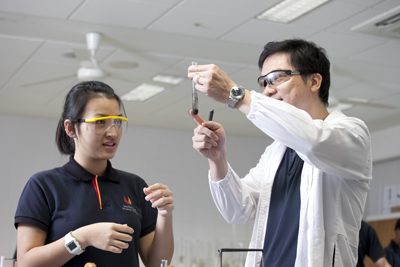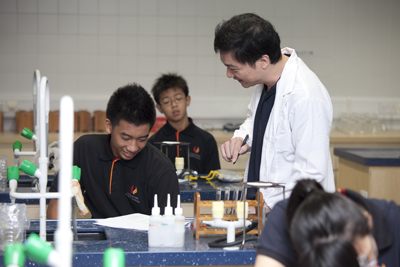Young Children’s Voices in Mathematical Problem Solving
Contributed by Dr Ho Siew Yin and Sng Wei Qin Abbie, from NTUC First Campus, for SingTeach Virtual […]
Read More
When it comes to teaching strategies, how do teachers know which ones work? For one teacher from Singapore Sports School, research is the way to go.
Imagine going to a salon for a haircut. At just $20, you get the best haircut of your life. Because of that, you keep going back to the same salon again and again.
One day, the salon closes and you have no choice but to patronize another salon. To your surprise, the new salon gives you an even better haircut. What’s more, it costs only $15.
Veteran teacher Mr Lawrence Lau uses this example to explain how tempting it is for teachers to stick to teaching methods that work. But there are often better strategies out there waiting to be discovered (or even created!). This process of discovery is what he thinks teacher research is about.

Photo courtesy of Singapore Sports School
“Is there a better way?”
Lawrence, who heads the Science Department at Singapore Sports School, feels that this is a question that teachers should always ask themselves.
“Even if I have been successful in my teaching and my students have been scoring well, there may be a better way still,” he explains. “There may be a better way which will result in better learning with the same amount of effort, or same amount of learning with less effort.”
While sticking to just one method of teaching isn’t Lawrence’s style, that’s not to say he will try out all the different teaching methods he can find. As he puts it, once you have a haircut, you have to live with it for at least a few weeks.
Teachers can be more selective by doing a literature review to find out if a particular pedagogical approach is worth trying out.
Once they have decided on a teaching approach, they can then implement it in the classroom and monitor themselves and their students closely. Do the students display signs of deeper engagement? Are there any aspects about the approach that should be tweaked? Should we try out the approach with more classes? Lawrence believes this constant questioning and reflection is part of doing research.
While many teachers may perceive research as additional work that is accompanied by writing of papers, data analyses and presentations, Lawrence says this is not always the case.
Not all research needs to be presented to a larger audience. Start small. It can be just within your own classroom or school.
– Lawrence Lau, Singapore Sports School
“Not all research needs to be presented to a larger audience,” he says. “Start small. It can be just within your own classroom or school.” Why not start with issues that teachers talk about when they gather at the coffee machine in the pantry? For example, the Science teachers at Singapore Sports School have initiated various action research projects on areas that interest them, such as differentiated instruction and formative assessment.
And to Lawrence, research – no matter how simple and small-scale – can lead to discoveries that one wouldn’t notice otherwise, such as patterns of weakness in a student’s learning. In this way, a teacher can get to know and understand that student’s needs better.
“By doing research, we can see much more clearly,” he says. Sometimes, teachers may get so carried away in their teaching that they fail to notice important signs in their classrooms, “but research allows us to see these details which normally escape us.”

Photo courtesy of Singapore Sports School
Other than teaching and heading a department, the indefatigable Lawrence also completed a Masters in Education, with a specialization in Curriculum, Teaching and Learning.
As part of his studies, Lawrence undertook research which, as he says, gave him “the opportunity to actually sit down and interview my students, and find out in depth about them – it was a real eye-opener.”
Early last year, he started on his Ed.D studies on students’ learning patterns in the Science classroom. After teaching more than 20 years, Lawrence is curious to find out how and why students learn Science differently. For some, it is by plain memorizing while for others, they learn by understanding.
His advice for teachers who wish to embark on research projects is simply to start small because juggling teaching and research is not an easy task.
“I have to work doubly hard and stay up late to clear my schedules,” he shares. “Who would go home after work to read about something serious? Not even myself, unless there is a motivation!”
Lawrence’s motivation is to constantly find a better way to teach, to become a more effective teacher. Just like the example he gave about hair salons, you never know how good it can get if you don’t try something else!